
Villa St.-Jean International School
1965 Commencement Speeches

 |
Villa St.-Jean International School |
 |
Editor's NOTE: The Commencement Speeches below are from a CD carefully compiled from a number of contributors by Former Villa student Kevin Di Palma . Kevin's CD was kindly sent to me by François "Chris" Orenga de Gaffory. So thank you Kevin and thank you François.
Kevin's Note for this section was as follows: "Ron Tee (1965) kept the commencement speeches for 35 years. All three speeches are good, Father Neumann's Commencement Sermon is uncommonly eloquent."
1. Commencement Sermon, Reverend Charles W. Neumann, S.M.
2. Valedictory Speech, Robert E. Lang
3. Salutatory Speech, Alan Winter
Commencement Sermon
June 4, 1965
To the Class of 1965
Rev. Charles W. Neumann, S.M.
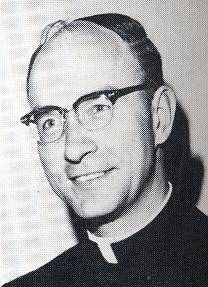
|
Amid the emotionally charged moments of life none are so fleeting as moments of farewell. Let us then deliberately prolong them in this final ceremony.
It is more than a farewell that bring us together. It is a thanksgiving. Let us then thank God, each in his own heart, for the gifts He has lavished on our graduates of 1965. Thus the appropriateness of distributing their diplomas during a religious service. "Give thanks upon all occasions; this is what God expects of you all in Christ Jesus." (I Thes. 5:18)
For rich indeed has been God's bounty toward these fourteen young men whom we honor today. Amid changes of residence, of national environment, of academic curriculum, amid the manifold adjustments of family life, of travel and boarding school experience, of friendships formed only to be challenged by separation, and after adapting successively to two, three or four schools, each with its own spirit and stamp, they have completed the years of high school. No comparable period of years will see in them such a pace of change and psychic growth, will be so crucial in their education or so laden with significance for a lifetime of happiness.
None of us knows more vividly what these last four years have wrought than do you, my dear graduates, who are closest to them. A moment's glance in retrospect tells you that in this short time you have encountered influences, formative or otherwise, that will have on your life an impact second in force only to the education you are receiving from your parents within the family.
You will remember these years -- and for the younger of your fellow-students it is a matter of the present -- as the time when boyhood began to take on the mould and cast of manhood. During these years your mind awakened to the challenge of self-consciousness and the thrill of original thought. During these years your heart awakened to the glow of another love than the filial love of dependence on parents -- a love of choice, restless in the demands it makes on your feelings, insatiable in its beckoning to fuller enjoyment. During these years you heard for the first time, under the lightsome melody of boyhood, the deeper tones of that "still sad music of humanity" which is suffering, and at that hearing you took your first step across the threshold of maturity.
In these last four years the course of a lifetime has been laid out; you shall hereafter by and large be the man you are now. Assuredly these were not yet the years of your greatness -- and to suggest, by some fatuous idealization of teen-agehood, that they were, and that the world should set its pace according to your opinions and tastes, would be to betray you. No, these were not your greatest years; but whatever the heights of greatness to which you aspire, they are already fixed in the course you have begun to plot during these years and in the ideals on which you have fixed your aim.
And so it is with a deep consciousness of the solemnity of the occasion bringing these years of high school to a close that we pause to congratulate you, along with your parents and teachers, on your having earned a high school diploma. And we wish you Godspeed on the next phase of your journey.
For you have passed a milestone in your education. But what is education?
It is more than the diploma you shortly will hold in your hands. More than the transcript that will secure your entrance into a university.
Education is more than the wealth of knowledge with which your teachers have brought you in touch, more than the academic skills they have helped you begin to master. These are the scholarly side of education. They form an indispensable part of your education, a part on which, as you have repeatedly been reminded, success in the next stage of your academic career and in life itself depends. But no one here has ever suggested they are the totality of your education.
Diploma, transcript, knowledge and skills do not even completely describe that part of your education, formation in matters of the mind, which your parents delegated to the school. The mind of its students is indeed the first and most obvious responsibility of the school. But what does a student ask his school to help him do with his mind?
Not simply to captivate the mind's attention, or to fill it with knowledge certifiable in tests. Not simply to learn how to think, but how to judge. Not simply to know, but to weigh knowledge. To enter life shunning the conceit of the pseudo-intellectual for the humility of the genuine learner. To realize that truth is like a light; that the brighter it burns, the broader the circle of surrounding shadow; that the more one learns, the more problems one will discover to be investigated.
To know, above all, how with one's mind -- and not simply under the sway of emotion or prejudice -- to pronounce a wise judgment on life, and, having done so, to remember that the educated man never rests on his oars.
It is then for the lifetime task of rowing in the stream of thought against the current of sloth, narrow-mindedness, or intellectual blindness that your teachers have endeavored to school you in using your knowledge to pronounce wise judgments on life, and to keep your judgments under constant review.
But there is a much deeper dimension to education, and particularly during these years of early adolescence. As you again, my dear graduates best bear witness, true education goes beyond the mind to enter the sacred sanctuary of your person where character is moulded and the fabric of habit woven.
It is in this phase of education that each of us feels most imperiously that he needs to help; that none of us is in all truth a self-educated man; that we cannot alone and unaided enlarge the narrow horizons of a boy's self-awareness into the breadth of vision in the mind and heart of a man. It is perhaps a begrudging witness we bear to our inadequacy at this point: for this need of others dawns on us just at an age when we most believed we were at last attaining independence.
In the face of this challenge, my dear graduates, you acted wisely. Whatever the newly-experienced thrill of autonomy during these years of adolescence, whatever the resentment at having to be docile yet, you wisely gave admittance to others who would help you in your education. And the purpose of their entrance was not simply to be another person like yourself, because they are not; not simply to agree with every judgment and evaluation of yours, because they cannot; not simply to enjoy your friendship, however gratifying; but to minister to your own courage in taking yourself in hand and building your own basic character. For this above all is your education.
To pursue it often meant not simply goading you on with the spur of challenge, but throwing you up against the stress of difficulty. But all was worth risking, because the lessons to be learned were so vital. No one, neither you nor the teachers proudest of you, would pretend that the lessons have all been learned. No education is finished short of life's end. No lifetime can be too long to spend, we believe, in deepening the most important lessons of character that we tried to learn together here. What were they?
To be honest enough to face yourself as you are, and brave enough to love what you ought to be. To be humble indeed in success, but no less proud and undaunted in honest failure. To have a heart that is clean, a laughter that is not cynical, a sense of wonder at the richness of God's creation, a readiness to thank everyone. To know that every deep joy was made to be shared with others, but that God gave us shoulders strong enough to try carrying our burden of trial alone; to know, therefore, that not all our tears are childish. To have true wisdom, which is tolerant, and true strength which is gentle. To have an appetite for adventure. Clarity of mind, temper of will, color of imagination, depth of emotion: these and all other natural virtues, without which life is only one long flight from oneself. By lessons in such as these does the human person unfold in all its native richness.
Yet there were even more weighty lessons to be learned here, my dear graduates, since this institution is a Catholic school founded on a Christian philosophy of education. Your mind has therefore been tutored here to pronounce judgment on life in the light of Christian faith. For in your Christian faith you have the unswerving standard according to which all that parades under the guise of truth or happiness or beauty can be measured. Your evaluation of life rests on the rock of your faith. For this, as you will notice many times, men will envy you.
But since your faith discloses to you an ideal far beyond even the most attractive natural values of the human person, you have need also of hope. On the one hand, you cannot be satisfied simply to contemplate your Christian ideal; yet on the other, you cannot take many steps toward it without being staggered by the steepness of your path. Moreover, your Catholic educators even cultivated more deeply in your character the radical tension that is already there between conduct and principle, and they helped you flex your muscle in this struggle between the self you are and the ideal, Christ, that you are called to be. This tension is the mainspring of your life-energy. Your teachers never permitted you to lose sight of it, never permitted you to forget that you were born not to rest but to wrestle, and that, if live you would, you shall live in balanced tension. But Christian hope is given you to bolster your courage, assuring you that with God's help you can become the man your conscience unrelentingly summons you to be.
And since all of you, men that you are, are called in some measure to share in that fatherhood which, as we heard in Saint Paul's words today, takes its name after the fatherhood of God (Eph. 3:15), you were schooled here in the first lessons of fatherhood -- to be responsible for others out of love. "By this shall men know you are my disciples, He said, that you love one another." You have been taught that man reaches his sublimest height when, out of a responsibility for others motivated by love, he posits his noblest act, which is sacrifice. "No greater love does a man have than to give his life for his friends." If you have learned to sacrifice with a smile and to suffer for others, you have solved every problem life can bring you, and many a problem in the lives of those for whom you will be responsible.
You are then, we hope, ready to be the Christian graduates our age needs: no longer just the martyr who takes his last-ditch stand witnessing to the truth and daring to be different in the name of principle, but the builder who takes the first step toward his neighbor, building bridges between man and man, and between men and their God.
These, then, are the lessons we worked hard at together: the fullest possible development of a person mature in mind and in character, oriented by Christian faith, hope, and charity toward a lifetime of responsible love toward men and an eternity of happiness with God.
No parting could be untinged with regret over all that yet remains to be learned. But the season of learning is a lifetime. Therefore your Alma Mater bids you farewell, not in regret over the realization that so much remains yet to be accomplished in your education, but in the hope that you will carry on for yourselves what she has striven most mightily to teach you.
And so, again in the words of St. Paul heard earlier in this Mass, we all -- your parents, teachers fellow-students, and friends, -- greet you, my dear graduates, with a final
wish and a prayer that we shall repeatedly address to God on your behalf:
"May you be enabled to know what passes knowledge.
May the Father of Our Lord Jesus Christ strengthen you through His Spirit with a power that reaches your innermost being.
May Christ find a dwelling-place, through faith, in your hearts.
May your lives be rooted in love, founded on love.
May you be filled with all the maturity God has to give."
(Eph. 3:16-19)
-- Rev. Charles W. Neumann, S.M.
VALEDICTORIAN ADDRESS
June 4, 1965
To the Class of 1965
Robert E. Lang

|
In the matter of a few hours the Senior Class of 1965 will have joined the ranks of the alumni of Villa Saint-Jean International School. In these last moments of our corporate identity as a class who spent one, two, or three years as students here, it is my privilege as valedictorian to find words for describing some of what we feel we have received. Let the mere detailing of our indebtedness express the extent of our gratitude.
The virtues of life in a European boarding school may be obscure and often not recognized until it is too late to fully appreciate them. They may even be chiefly ethereal, but in our case they have provided an extremely sound basis for a college education and for happiness in later life.
One European city among many others -- a small venerable old Swiss town -- has surrounded us with many cultural opportunities, not the least of which is a life that is at the same time so much like ours and so different. It has provided an incentive for the industrious study of French and German. The very existence of the Seminary across the road and the University in downtown Fribourg have given us a concept of what is to be expected of us in later life, both academically and morally, as well as socially.
Far more important than those advantages, the Villa has provided an environment in which the emphasis is on personal relationship and achievement in any field for which our talents equip us. The faculty and students, who come from so many nations, have given us an understanding and sympathy toward sectional conflicts that plague schools which do not have the advantage of an international character.
More important yet, the Villa has urged us to think as individuals -- a quality lacking in so many American schools whose students find themselves subject to every changing fad and to an ever deadening conformity. Our school, we think, tries to make the student think as a man, not merely as a machine.
We have had the opportunity to view objectively the countries from which we come, both criticizing with love and praising with sobriety.
The chance, moreover, to represent one's own country abroad as a young person is not easily found. In a time when America's good intentions are so misunderstood by foreigners, we at the Villa are thankful to have had the chance to show how much of value we think our country has to give a groping world.
But charity indeed begins at home. And we hope we as a class have shown also what we can give, closest at hand, to our school. For she is in a sense a young school, and we have had the privilege of growing up with her. As any young person, she took looks to the future. Better relations with other schools in our position, improvement of our spacious campus, and the increase of school spirit and cooperation between faculty and student body will all contribute to the advancement of an already exceptional school.
And looking ahead to our own personal future, we feel ready to face all that college and life hold in prospect.
College and life -- for college will be only another four shot years for most of us, in a life that is moving at a faster pace than ever before.
It seems only yesterday that the moon was a mere face in the sky, unattainable; only a few more years now, and a man will be walking out onto it. At this very moment Spaceship Gemini is circling the earth, with two men about to float freely in space. Computers have revolutionized science, mathematics and even business. Early Bird make the world itself a single television audience.
Human relations too are rapidly changing and improving. Amid crises that terrify the weak-hearted, serious men are groping for a more personal view of honesty, sex, love, fidelity, and respect for one's fellow man.
This then is the world as it moves today -- slowing down for no man. This is the world in which we Seniors of Villa Saint Jean are to live and exercise our responsibility. Our faculty and parents have realized this and it is for this they have prepared us.
Inasmuch as today we complete a stage in the process of preparation, we step forward to meet this moving world with all the confidence their efforts have founded in us.
We say our sincere thanks to them for all they have done to help prepare us to live bravely in this world.
But, breaking with the tradition of valedictorians, we do not say farewell. One says farewell only to those he leaves behind. One's friends he takes with him as company for a lifetime.
-- Robert E. Lang, '65
SALUTATORY ADDRESS
June 4, 1965
To the Class of 1965
Alan Winter
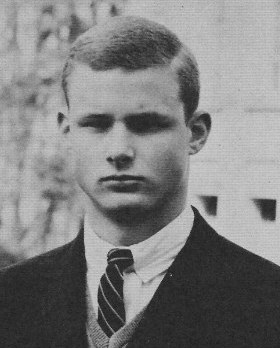
|
It is my privilege as spokesman for my fellow-graduates of the Class of '65 of Villa St. Jean International School to welcome all of your to our Class Day presentation of awards and to the Commencement Exercises which will follow immediately thereafter.
We thank you especially, our parents and friends, for traveling to Fribourg to take part in these simple ceremonies.
Speaking in the name of those who are about to receive awards of achievement this morning, I say thanks to everyone here, since by your presence you are enhancing the recognition which our school has seen fit to give the efforts of its students.
If there is joy in the hearts of those of us who receive diplomas and awards, we are particularly happy that you, parents, faculty, and fellow-students, are here to share that joy. It is, after all, to you that any person honored today owes his diploma or award.
To you, our parents, obviously, for having sent us to Villa St. Jean.
To you, our teachers, for having guided us in our studies.
To you, our fellow-students, for the spur of friendly competition that brings the best out of each of us, academically, athletically, and socially. No award would mean much if it had been won hands-down and without competition. And so it is really every one of us who is being recognized on this Class Day. May our joy together be the last memory we carry away from the year now concluding.
* * *
Traditionally it is the role of the salutatorian also to try to phrase the message the graduating class leaves behind. And, as usual, it is especially to the students who now already form the heart of the Senior Class of '66 that we address ourselves.
In this, never fear, we are no clear-sighted experts. We are not so arrogant as to think you could profit more from our advice than from the mistakes we made together.
But, to put our message briefly, we think a person, if he is any king of a man, finds what he is looking for. And good things, once found, are meant to be shared.
If we think we found anything here, it would be a growing awareness of what opportunities a high school student has for personal enrichment in an international school in Europe. Our hope is that your discovery be even richer.
We hope you will have the opportunity not only to discover much, but to give much. For, when all is said and done, each of us will be remembered around here not for what he took away from this school, but for what he gave it.
Because our school is young, your class and ours have probably done more than either of our predecessors to begin shaping her traditions. May you enjoy the cooperation of all the underclassmen in that continuing work.
So, to you, with best wishes, we leave the task of leading the rest of the students of Villa Saint Jean in discovering what is good around you, and in giving the best that is in you.
-- Alan Winter, '65
COMMENT 7/18/2021: I was going through some old files in my basement when I ran across an old mimeograph document dated June 4th 1965 entitled "CLASS DAY and GRAUATION CEREMONIES" for VSJ!!!
Unfortunately the pages had faded with time and were barely legible. Below, I've tried to enhance the best I could so, with some effort, one can "mostly" make out the text. On some I tried inversing the image to get better contrast. Regardless, for those wanting to trip down memory lane, here's the document.

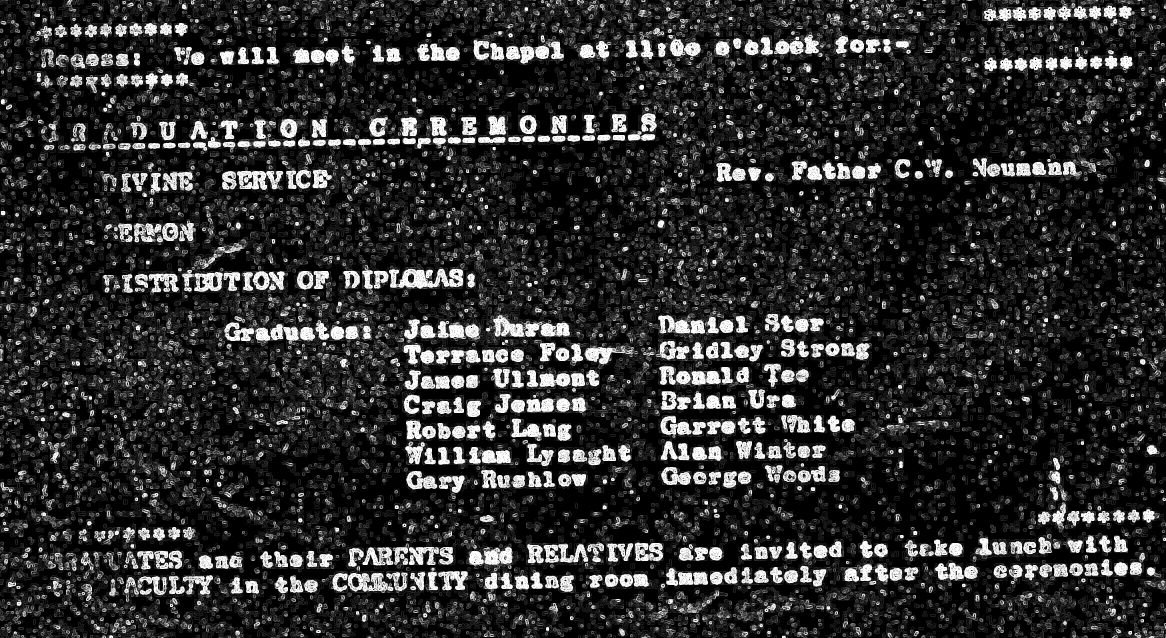
page 2 CLASS LEADERS

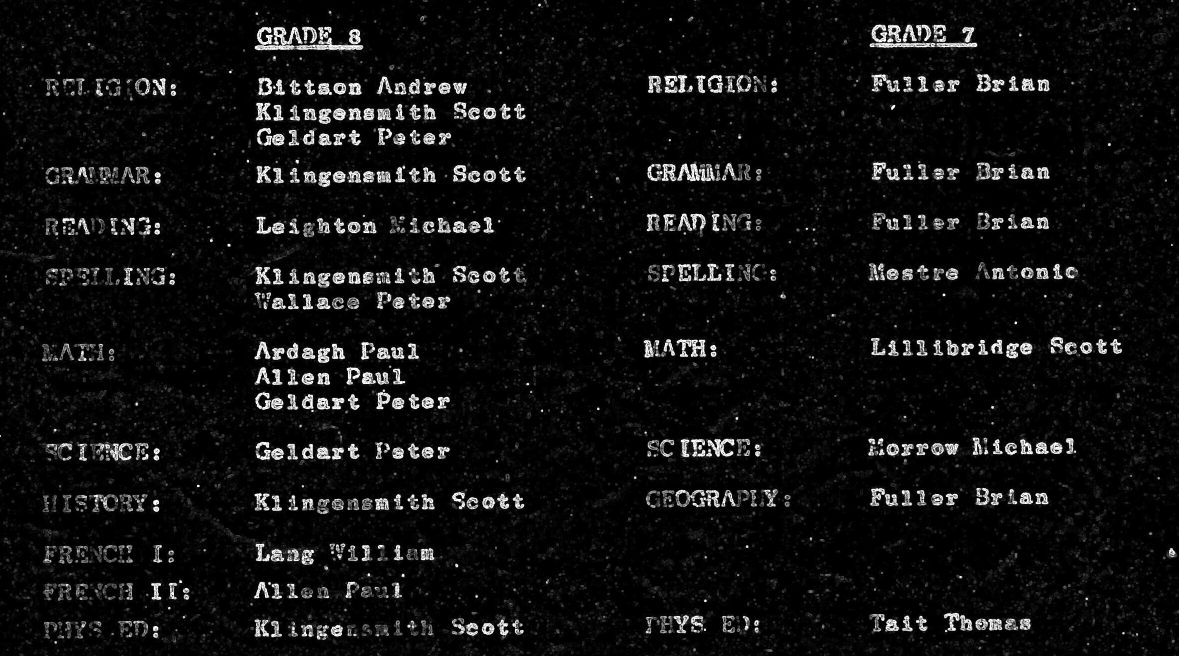
page 3 HONOR ROLL
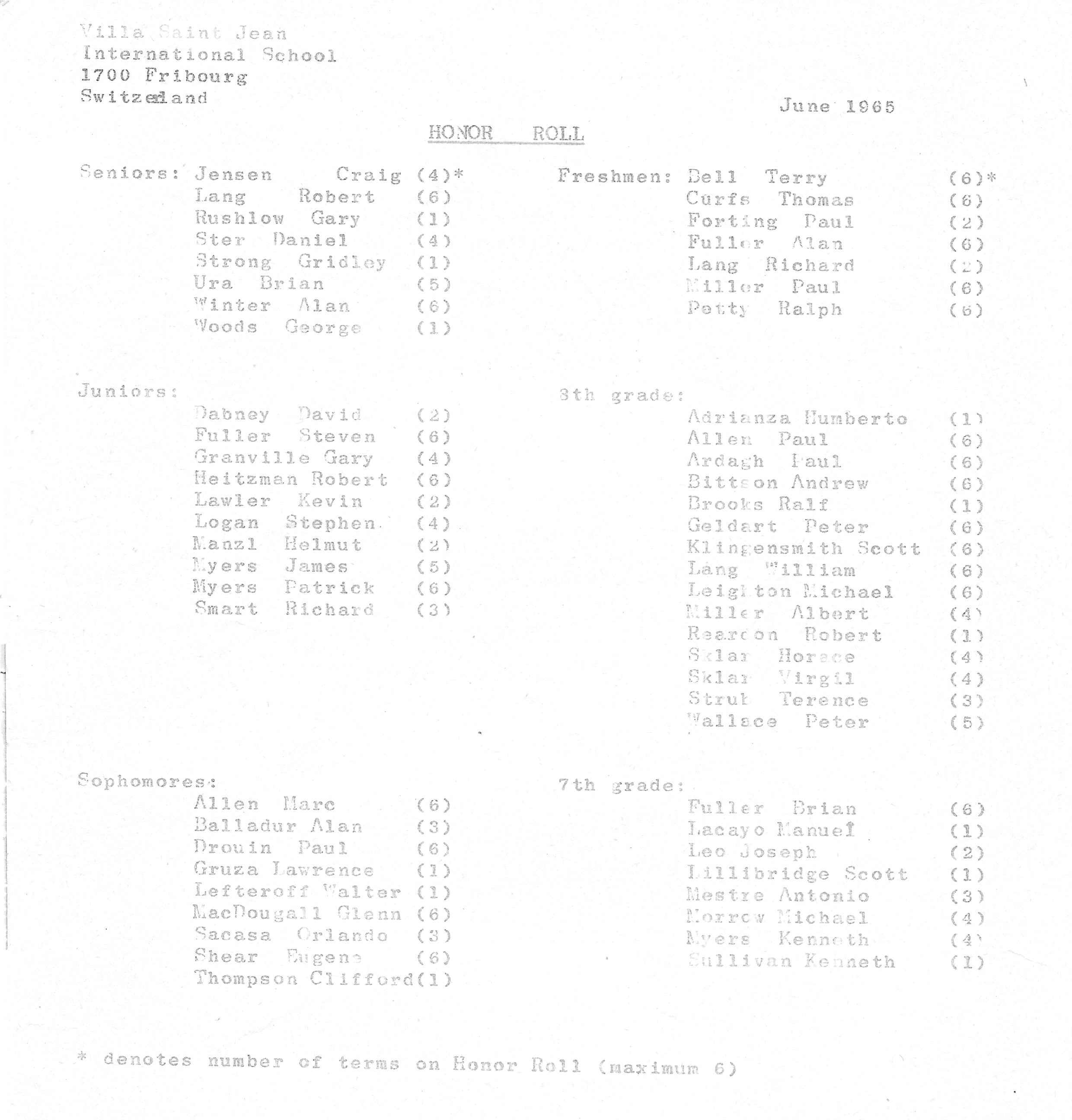
page 4 Perfect Attendance / Basketball Letters
.jpg)
page 5 GRADUATES 1965
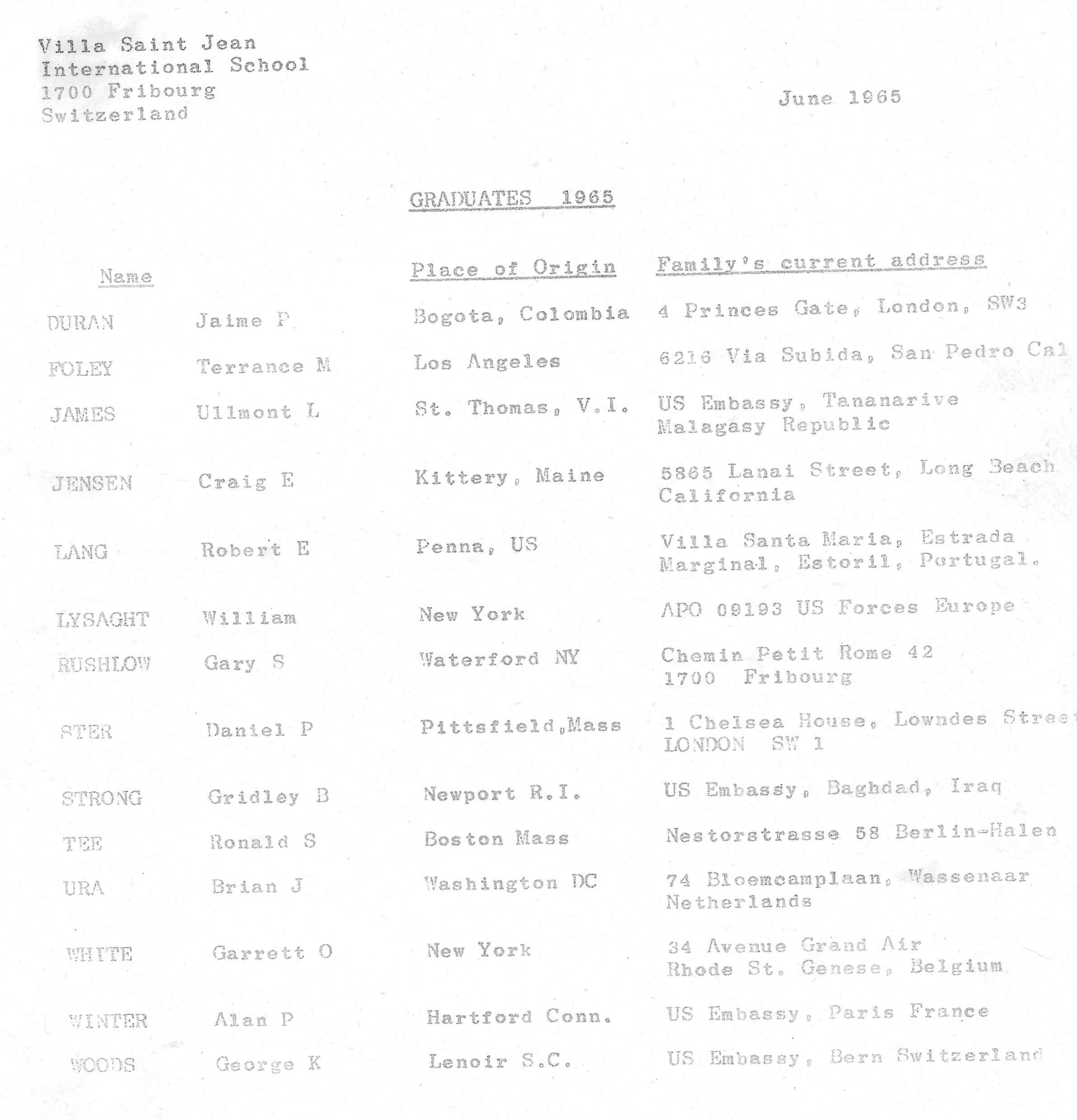
| PREVIOUS PAGE | GO TO TOP OF PAGE FOR VSJ NAVIGATION MENU |
NEXT PAGE |
Ralf Brooks' Villa St.-Jean Collège Français & International School WEB SITE